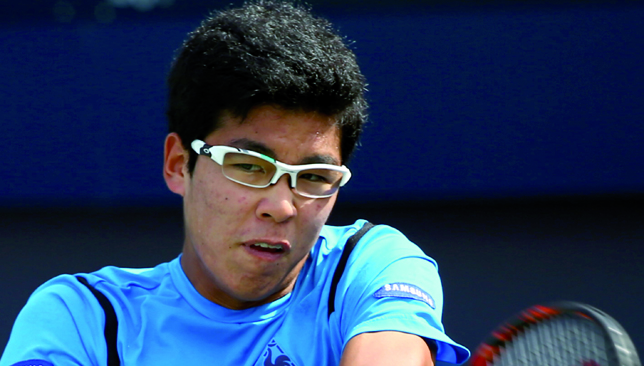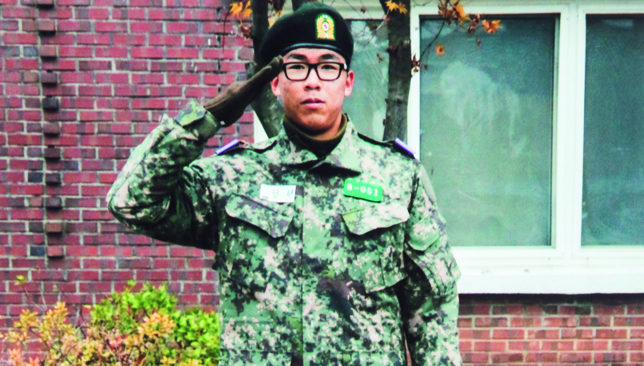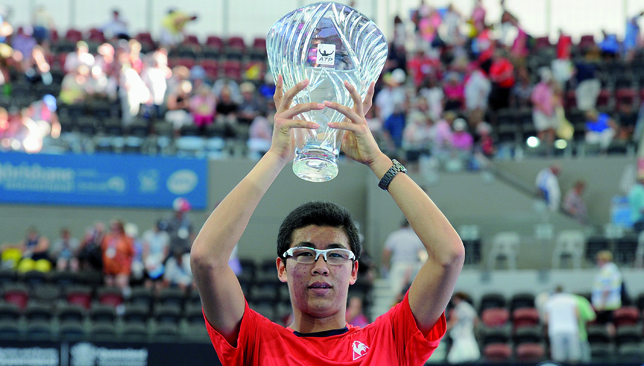
The conversation does not necessarily flow when you’re speaking to Chung Hyeon in English, but hidden between the monosyllabic responses, there is an underlying sense of humour.
Having just started to learn the language at the end of last year, the 19-year-old South Korean has dramatically improved within a short span of time but is still reluctant to say too much.
His father Seok-Jin used to be a tennis player back home in Suwon, a town 30km outside Seoul. Was he any good? “He says he was,” Chung responds with a laugh.
The bespectacled youngster, who was named the ATP’s Most Improved Player of the Year last November, climbed from 167 to 51 in the rankings in 2015 – thanks to the four titles he won on the Challenger Tour – and is currently one of just four teenagers ranked in the top 100 (behind Borna Coric and Alexander Zverev and ahead of Taylor Fritz).
He was unable to attend the ATP’s awards ceremony himself as he was completing a mandatory four-week military training in Korea. He is the first Korean in history to receive an ATP award of any kind.
Chung grew up hitting balls with his older brother – a lefty who now plays tennis at the collegiate level in Korea – and spent two years at the Nick Bollettieri Academy in Florida from the age of 13 to 15.
He is now a key figure in the ATP’s ‘Next Generation’, a campaign launched by the tour at Indian Wells this week which focuses on the players born in 1995 or later that are ranked in the top 200.
Currently playing his first full season on the ATP tour, Chung is trying to adapt to many things at once, be it competing at a higher level against tougher players, handling the pressure that comes with playing against the big guns and most of all, getting acquainted with the people without being able to communicate with them properly.
“Everything is different from juniors. The players are different, the tournaments, the people are different, it’s hard to play on tour,” says Chung.
Tennis is a lonely enough sport without the added obstacle of having a language barrier. It is a reality Chung has realised early on.
His friend David Hyondo travels with him as often as possible and speaks to him only in English, in order to help Chung improve.
“He gives me homework,” Chung explains. “He tells me to watch American dramas, so I watch Prison Break. And Modern Family too.
“Now that I’m studying English, things are getting a bit easier on tour.”

Serving his country: Chung on military duty.
Chung had quite the peculiar reason to get into tennis. He had poor eyesight as a young child and his doctor advised him to concentrate on the colour green in order to see better.
His father thought playing tennis and focusing on the fuzzy ball would help and since then, Chung has never looked back. In 2013, he showed early signs of what he is capable of when he made the Wimbledon juniors final, taking out Nick Kyrgios and Borna Coric along the way.
Kyrgios is already a two-time grand slam quarter-finalist, is ranked No27 in the world, thanks to a title run in Marseille last month, and has seven top-10 scalps to his name.
Coric is the youngest player in the top-50, has made his first ATP final in Chennai in January, and has two top-10 wins under his belt against Rafael Nadal and Andy Murray.
Chung is aware he remains a step behind them as he is still finding his bearings on the ATP tour. He doesn’t feel the ‘Next Generation’ can disturb the tennis order at the top this season.
“Kyrgios can make the top 10 I think. After a few years maybe the younger generation can make an impact,” he says.
Not this year? “Maybe, I don’t know,” he says with hesitation. “For me personally, I need to adapt mentally and physically. In tennis, you need to have a big serve too so I’m trying to work on my serve.”

He finds the success Kyrgios and Coric are having so far as a real encouragement. “It’s good for me because I played them in juniors, in under-14, in the junior slams, so now maybe I can do as well as they are doing,” adds Chung.
He idolises Novak Djokovic and faced the world No1 in the Australian Open in January. He lost in straights, but showed glimpses of his highly-touted talent.
“Djokovic plays good baseline and is strong mentally, everything is good, perfect, that’s why I look up to him,” says Chung. “It was a good experience, a chance to learn from him.”
Chung is also strong from the baseline, although he has some unorthodox strokes, his forehand bordering on the bizarre technique of Ernests Gulbis, where the Latvian’s stance before hitting the shot looks like he’s standing on a surfboard.
“I like playing from the baseline but I want to improve some net play and my return,” he asserts.
Chung is single-handedly putting South Korea on the tennis map and he will be looking to leave his mark when he makes his Indian Wells debut this week. Are the masses taking notice of his progress back home?
“In Korea I only get attention on the tennis court, but on the street no, because tennis isn’t popular at home. Football, baseball, basketball, swimming…” he says.
It’s fair to assume that won’t be the case much longer.